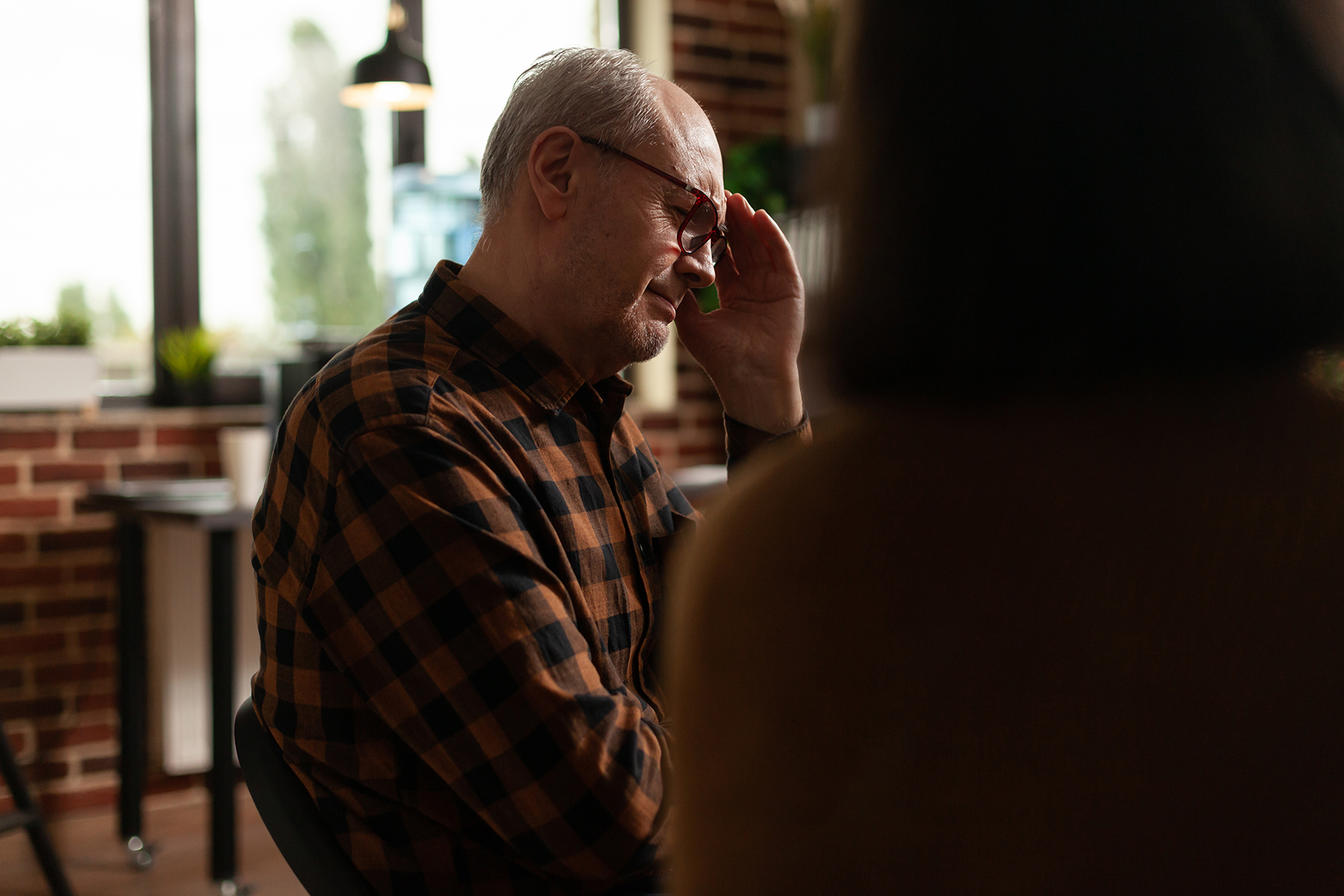It’s never too late to make a change, stop drinking, repair relationships and make lasting memories for yourself and your family. Whether you’re 50, 60, 70 or older, we know from experience just how important it is to the family of an addict to see them make a real change and make amends. Don’t let alcohol take you away from your family for more years, and waste more time in a cycle of pain and shame. You’re never too old to get sober.
In our private rehabilitation centre, we are currently working with a man in his 70s who is inspiring us with his determination and focus to get better for himself and to be the grandfather he wants to be. He is facing his issues, rather than leaving his family with bad memories of him simply as an alcoholic and feelings of pain and anger for the mistakes he made.
We feel it is vital to share his story and address the question, “What’s the point in getting sober when I have been drinking for so long and the best years of my life are over?”. We’ve seen with our own eyes, what happiness and hope for the future is possible in the later years of life. We know the importance of rebuilding relationships, undoing the damage which years of addiction has caused and how positive it is to have the opportunity to inspire others by passing the message on.
Real and lasting change is possible at any age and with the right support and courage you can break the cycle of addiction. We want to encourage anyone who has a problem with drinking to set things right, before you run out of time. Drinking and using removes our power and our choices, but it is possible to take back control. When we get sober, we have choices and that’s so important at any time in our lives.
We hope this story inspires you as much as it has inspired us and give you hope and the courage to seek help. Please contact us if you’re ready to make a change and start living a dignified, decent life.
Committing to sobriety at 72 years old
We currently have a 72-year-old man undergoing treatment at our private rehabilitation centre, who is turning his life around. He is inspiring everyone at the centre and showing us that you are never too old to stop drinking.
He had been drinking all his life and told us that all his memories, ever since he started drinking at 18 years old, were of pain and shame. Despite a life lived addicted to alcohol, he was a very high achiever and a functioning alcoholic, who made millions and led a successful company. Unfortunately, the drinking did eventually take its toll on him. He lost a lot financially and the addiction ended his marriage and damaged his relationship with his sons and family as a whole.
After retirement, he found himself alone in Spain, trapped in a small apartment, drinking three bottles of wine and eight beers every day, isolated and depressed. With his family relationships in tatters and a legacy of not being the father or the husband he wanted to be, he decided that enough was enough and that he wanted to change and so contacted us.
Co-Founder of The Bridge Howard Silver explains, “I had several calls with this client, discussing how we could help, before he decided to put his trust in us and get the support he so desperately needed. I have found the experience of working with him really emotional. To see someone who has been so successful taking advice and having the humility and courage to get sober and enjoy the rest of his life is extremely inspiring. He is motivated to be sober for his grandchild, when he never was able to be sober for his own children.
As someone who is 78 myself and has been through the sobriety journey, I know without question that I wouldn’t want to die a drunk and leave those memories behind. No matter how hard it is to recover, or how many years you have left, it is worth it to make new, positive memories and leave behind a legacy that your family will thank you for.”
Expect cynicism from the family
“One marked difference that you can see with our older clients is their family’s reaction to their sobriety. They are happy to see their loved one get help and stop drinking, but after years and years of broken promises and relapses, they are understandably cynical”, explains Howard.
“In this particular case, one of their sons paid for the treatment, but didn’t have high expectations of long-term sobriety. They were pleased their father was safe and being looked after for a few weeks at least, but didn’t really believe they could make a meaningful and long-lasting change.
It is very hard to be a child of an addict, and there’s a real reason why this is known as a family disease. Sadly, our client’s sons had really suffered and been left with lasting issues due to their Dad’s drinking and behaviour, but thankfully they still cared enough to enable him to go through alcoholism treatment and with our help I really believe that he will make it work this time.
He doesn’t want to negatively impact his family anymore, and is changing his thought process from pain and shame to hope and belief in his future. He’s trying to make real amends, not by simply saying sorry and making promises, but by changing his thought patterns and behaviours and showing his family every day that he cares and wants to be a better person.
I have been humbled and deeply impressed to see this man work so hard to make a difference. After just two weeks in our private rehabilitation centre he is sober and living emotions that he has supressed through drinking for so many years. He’s crying, he’s smiling and more importantly he’s feeling good about himself and has hope for his future. This is the very opposite of how he was living his life before he came to us, drinking alone, depressed and isolated, with his whole life getting smaller and being diminished by his addiction to alcohol.
Now he is finally living his life with dignity. He’s being so brave and strong and is making amends for all the mistakes he has made and the damage he has done. He is now able to see a future where he can live a good and happy life for however long he may have left. He is committed to being present and sober for his grandchild and to make happy, positive memories with his family at last.
I feel honoured to be able to support him through this change and so very proud of him for his commitment and work. I hope by telling his story, other older alcoholics will be brave enough to follow in his footsteps.”
What’s the point in getting sober after all this time?
“Some of our older clients who have come into rehab due to family pressure can lack the motivation to get sober, as they feel like it’s too late”, explains Co-Founder Ali Silver. “Seeing younger clients with their whole life ahead of them, and the concept that old dogs can’t learn new tricks can put people off from even trying.
But even those clients who have started the journey with scepticism have been amazed by how good they feel, how much more energy they have and how much better they are sleeping even just a few weeks after stopping drinking.
Once they are sober and thinking clearly, often for the first time in many years, we help them to learn how to take proper care of themselves. We use intensive therapy to get to the root of why they were drinking in the first place and address any underlying trauma or mental health issues that they may have. Then we work with them to build up their self-confidence and mental and physical strength and equip them with coping mechanisms for life in the outside world, without the crutch of alcohol.
Their families are so proud to see how far they have come and we work with the families, through family therapy, to rebuild relationships which have been broken after years of addiction. This family therapy is crucial to give clients both the reasons to keep striving to stay sober and the support structure they need to make it a long-term change.
It’s so wonderful to see them leave rehab with a completely different way of thinking and a more positive outlook, looking and feeling healthier and fitter and with a new lease of life. There’s never a bad time to make a change like that and it really shows!”
Howard adds, “Getting sober in your later life is often motivated by thinking about what legacy you want to leave behind. Will you leave damage and pain behind, or will you work to create the memories of love and support in the later years of your life?
Unfortunately, children or family members of someone who dies of alcoholism never really recover. They are left with feelings of anger, guilt and sadness for a wasted life and they are never the same. So, we encourage any parent or partner to think about what they would leave behind if they died without changing and if their drinking took away any chance of a happy future for them and their families.
Just because you’ve tried and failed before, doesn’t mean you shouldn’t try again. Think about how wonderful it would be for you and everyone you loved if you succeeded and had many happy years of making good memories ahead of you. How special would that be?
If you’re ready to make a change we know that we can help you at The Bridge. We’re really good at inspiring new thinking and new positive behaviours, as well as offering long standing support after leaving the centre, which gives our clients the very best chance of a lasting recovery journey.
At 78 years old and 34 years sober I am so grateful for every moment and memory I make with my wife, daughter and granddaughter and would love to help as many people as I can to find the happiness and peace that I have, without needing alcohol or drugs. It’s never too late to find that happiness and we’re here to support you every step of the way.”
Contact us to discuss how we can help you.




